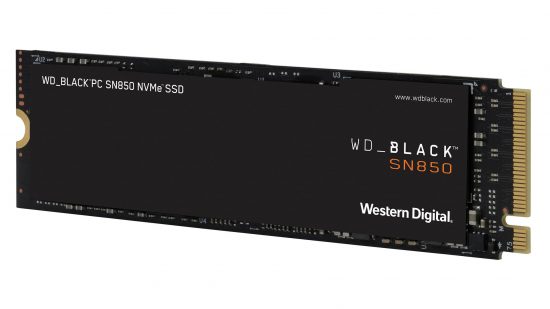Our Verdict
87%Faster and cheaper than the high-speed PCI-E 4 competition, but don’t forget a heatsink.
When it comes to SSDs, WD hasn’t been around as long as some manufacturers, but it’s catching up quickly with a host of good models already to its name. The SN850 is the pinnacle of its mainstream SSD achievements so far, and certainly boasts some impressive specifications. This high-end drive clearly aims to topple the Samsung 980 Pro and any Phison-based SSDs from their perches, thanks to the company’s in-house WD Black G2 controller.
The SN850 uses TLC memory, a portion of which is siphoned off to create an SLC-like cache that’s fast at writing data. In this case, there’s around 300GB on offer, which betters the 114GB of the Samsung 980 Pro, but is similar to other PCI-E 4 SSDs. Once you get beyond that point, the write speed will tail off.
There’s also a DDR4 cache and a dedicated 12GB SLC chunk of cache too, which is available even when the SSD is full. But, let’s face it, when was the last time you were shoving around that much data? If it’s on a regular basis for you then you may need to consider a more professional-level drive, but for the vast majority of us, these specs are ample.
The drive comes in versions with and without a heatsink, but whichever you choose you will definitely need a heatsink of some sort. Without a heatsink, the SSD rocketed up to 80°C after just a few moments and topped 90°C before our five-minute stress test was finished. This saw the CrystalDiskMark sequential speeds fall to 4,000MB/sec and 3,230MB/sec respectively for reading and writing, compared to 6,931MB/sec and 5,330MB/sec when we installed our motherboard’s heatsink.
It’s a shame, then, that WD charges an extortionate amount for the heatsink-clad version of the SN850, which won’t leave you with much change from $220. Clearly, if your motherboard lacks a heatsink, you’d do much better to buy a third-party one from the likes of EK or SilverStone, which will cost you under $20.
With the CrystalDiskMark sequential tests out of the way, the 32 queue-depth 4K random speeds were fantastic, with the SN850’s read speed of 2,172MB/sec being among the fastest we’ve yet tested. AS-SSD’s sequential tests showed a similar story, albeit with the SN850 being a few hundred megabytes per second off the Gigabyte Aorus Gen4 7000s’ top spot.
In AS-SSD, the 4K random read speed was also slower than the competition, with a result of 60MB/sec. The WD Black SN850 redeemed itself in the write test, though, again claiming the top spot here and in the 64-thread 4K IOPS read test too. That said, the write test put it below the competition again, albeit with big leads over cheaper models.
WD Black SN850 pros and cons
Pros
- Excellent performance in most tests
- Good combination of cache systems
- Cheaper than competition
Cons
- Needs a third-party heatsink to prevent throttling
- Heatsink-equipped model is expensive
- Not the fastest in all tests
WD Black SN850 specs
The WD Black SN850 specs list is:
| Interface | PCI-E 4 |
| Max capacity | 1TB |
| Formatted capacity | 930GB |
| Controller | WD Black G2 |
| Endurance rating | 600TBW (2TB) |
| Warranty | Five years |
| NAND | TLC |
WD Black SN850 price
Price: Expect to pay $220 for 2TB.
WD Black SN850 review conclusion
With a substantial price saving if you opt for the heatsink-less model and use your own, the WD SN850 currently offers a great buy if you want maximum performance and value.
If you don’t need quite as much grunt, the ADATA XPG GAMMIX S50 Lite offers even better value and for maximum value WD’s own SN550 is half the price. It’s slower on paper, but you won’t notice much difference in day-to-day operation. If you want the fastest performance possible for the best price, though, then the SN850 is for you.
Looking for more storage upgrade options? Check out our guide to the best gaming SSD where we recommend options for every budget, with 1TB drives starting from just $55.
